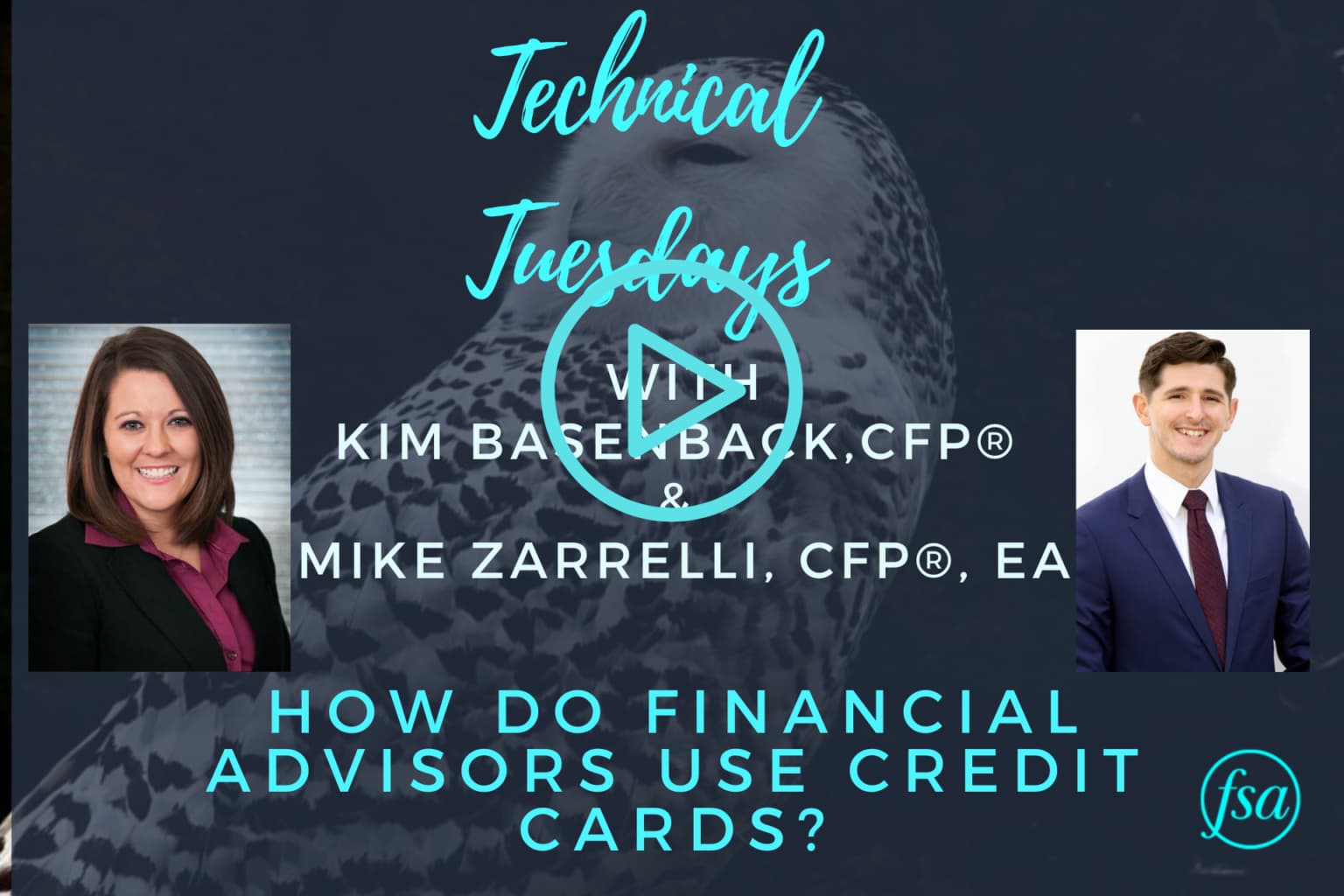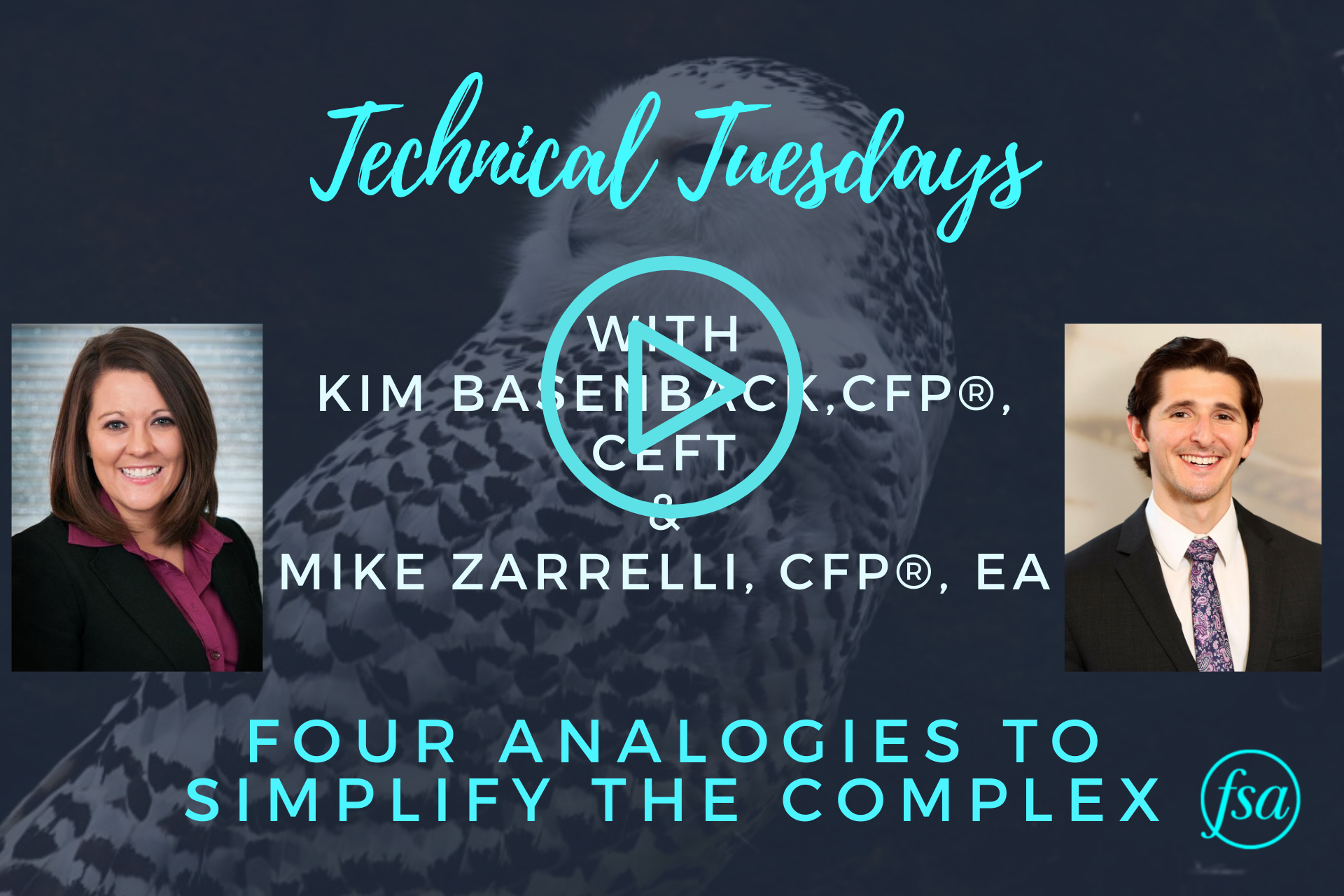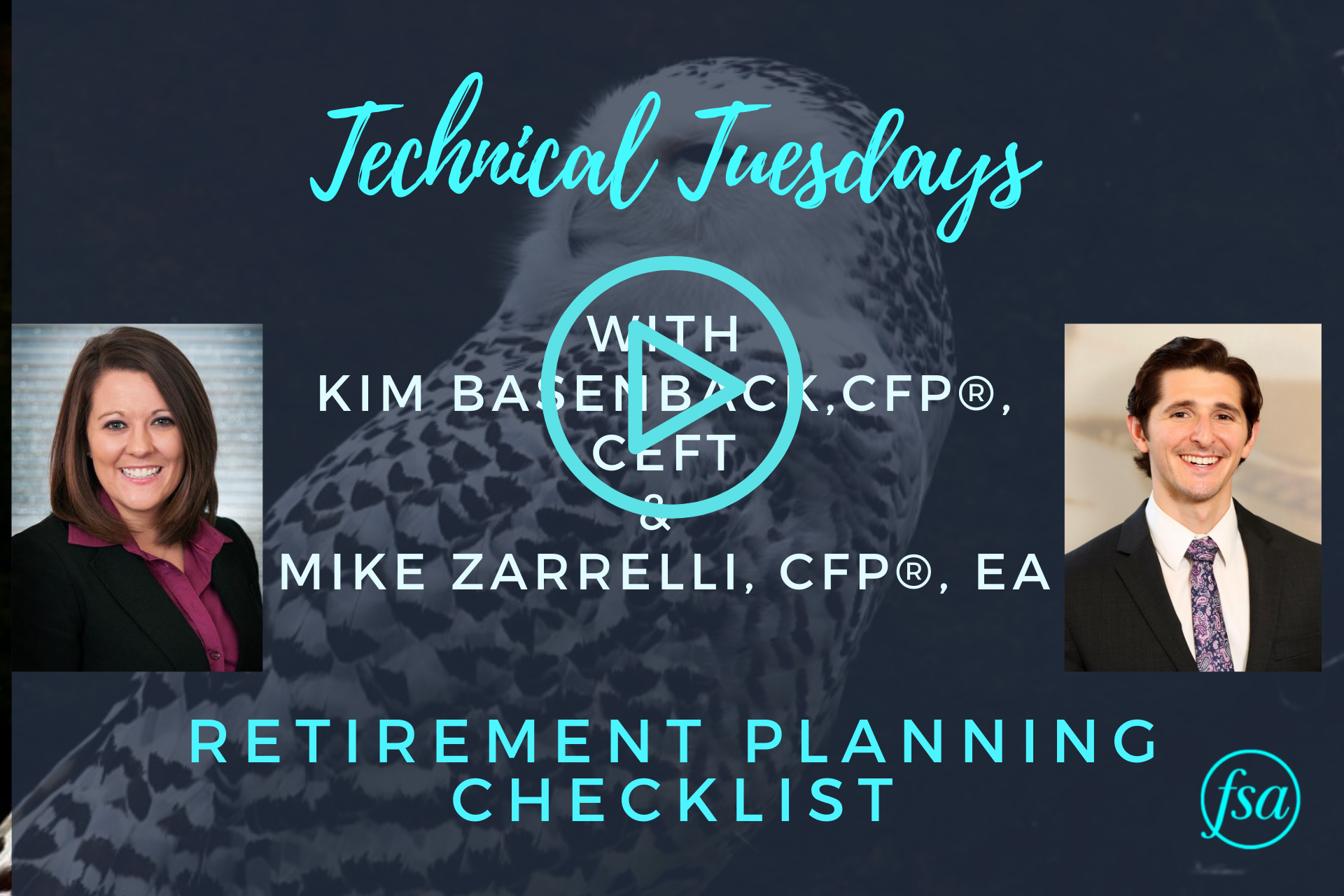Kim Basenback, CFP®, and Mike Zarrelli, CFP®, EA, share tips and tricks on how they use their credit cards to their best advantage.
How Do Financial Advisors Use Credit Cards Transcript
Mike:
Thanks for joining, everyone. This is our October Technical Tuesdays, and this time Kim and I are going to cover how financial advisors use credit cards. Now, this is going to be a little more of an advanced video than we normally do. So Kim, are there any disclaimers or lay of the land that you want to give the viewers?
Kim:
Yeah, so we want to say first and foremost, this video is designed for individuals that are paying off your credit card bills every single month. There is no carrying of a balance because all of our tips and tricks and kind of ways to work the system really don’t work if you’re paying those really high interest rates that credit cards charge for carrying a balance. So, really important that, from a cash-flow perspective, you’re only putting expenses on credit cards that you’re able to pay off. In fact, both of us utilize auto payment because we want to make sure those cards are never missed and all of the balances are paid off. So, that is the most important thing, first and foremost. If that’s you and you pay off your credit cards every month and you’re able to kind of manage making sure that’s paid off, then we’ve got some tips and tricks for you. So Mike, why don’t you start off with telling us more about how many cards you have, what type of rewards they offer?
Mike:
Yeah. Sure. So, as it is with many financial topics, there’s a spectrum, and I’m on probably the extreme side of the spectrum for credit cards. I currently have eight, and the reason I do is because I really like maximizing the cash back or rewards that I’m getting from my purchases. So I have a credit card that gets 4% back at the pump, 3% back at the grocery store. I have the Amazon card that gets 5% back on Amazon purchases because I have a lot of those, another card that’s 5% but it rotates the categories each quarter so you can maximize those ways, and then a travel card that is really beneficial for hotels and flights, and then a catch-all 2% back on everything card that spans the whole gambit. So Kim, how about you? How many credit cards do you have?
Kim:
So the irony here is I actually have eight as well, but we will say we’re not recommending everyone go out and get eight credit cards. Mike and I just happen to be in the same boat, and we like to utilize those rewards. So just as Mike said, I like to think through, okay, where am I going to get the biggest bang for my buck, the biggest reward? If I’m at the grocery store, I’m going to use the credit card that gives me the highest rewards on groceries.
Now, not everybody’s like that, and it can still work. So my husband would prefer not to walk up to a register and have eight credit cards and have to decide each time which credit card to use. And so for him he has two, and those two we picked are the kind of biggest bang for your buck on the widest variety of purchases so that he’s not having to think through, I’m at Amazon, I should use this card; I’m at the pump, I’m going to use this card; it’s a different card at Costco. I mean, that’s a lot to manage. So, it’s important to balance how much hassle you take on for the reward. So it’s different for everybody.
Mike:
So with that, we have the same amount of credit cards, probably similar cash back and bonuses and such. Do you have any tips or tricks for the credit cards that you use?
Kim:
Sure. Yeah. So a couple things. One, when you get a new credit card, it’s important to pay attention to the sign-on bonus. What type of perks are they giving you upfront? Sometimes it’s a cash bonus if you spend a certain amount within two or three months, and sometimes it’s travel rewards. It depends on the credit card, but it’s good to know what you can get up front and utilize those. Now, we will talk about in a few minutes some caveats and some kind of potholes to look out for. But yeah, so it’s good to know what kind of sign-on bonus you have.
For me personally, I use my cash back. It’s actually a way that I buy my Christmas presents through all my cash back. So I kind of stack it all up throughout the year. I don’t have to budget for Christmas or save separately for Christmas presents. I know that all of my cash back are going to go towards my Christmas presents. And I will say I have a pretty big family, so being one of five with ten nieces and nephews, it’s a lot to buy for. So it’s nice to have that knowing that I’m going to use those rewards in that way. Those are a couple. Mike what would you add to that?
Mike:
Yeah, so I’d like to separate between travel points and cash back. For travel points, I specifically use them for travel expenses because they sometimes have multipliers if you go through the right portal or use the right airline so you can really maximize those points. Whereas with the cash back and the sign-on bonuses, what I like to do is take that cash and actually invest it in my brokerage account, and it’s only, we’ll say 300, $400 per year, so it’s not much, but I know over those decades of investing that can really create something neat for me in the future.
And then my second tip is pay attention to the promos that these credit cards have. Sometimes they’ll have an offering where you’ll get extra cash back on a specific retailer. One specific example is I had a promo for Sam’s Club, and it was for signing up for their membership. At the same time, Sam’s Club was doing a deal where one-year membership for your first year membership’s $45 and you get $45 back on your first purchase, essentially making it even zero at the end of the day. With that I used a 12% back promo, so my credit card paid me $5 to sign up for Sam’s Club all risk free. So there is a little bit of arbitrage if you can just pay attention and play the system.
Now it’s not all sunshine and rainbows with the credit cards. Kim, what are some mistakes, or how can you get in trouble with credit cards?
Kim:
Yeah. Obviously anytime you’re opening a credit card, you’re impacting your credit. So, it’s really important to keep in mind and keep an eye on your credit, especially if you’re in a time period where you might be buying a house or buying a car or getting some sort of debt where someone is checking your credit. So, few things to keep a lookout for. Be careful not to open too many accounts at once because if you’re opening a ton, that starts to look a little risky from a credit perspective. Also, be careful how many cards you’re opening and closing because closing an account also does impact your credit, especially if it’s a card that you’ve had forever. Mike and I talked about this; we both have cards from when we were in high school or college that we don’t use anymore because the rewards aren’t great, but we have to use it at least once a year to make sure that we’re keeping that card active because it’s the longest history that we have. So it’s important to keep an eye on that.
And then also make sure you’re not missing any payments. We said that at the beginning. We suggest utilizing auto payments of some sort, making sure that your payment is always, your statement balance is always paid in full so that you’re not paying any interest. And that goes along with making sure you’re managing your debt and making sure that you’re not taking on too much. When we talked about credit, generally you have a limit for each credit card that you can utilize. We would suggest not utilizing the full limit because that can impact your credit as well. Generally a good rule of thumb is only utilizing about 30% of the debt that is given to you. So let’s say your credit card or several credit cards all together have about 30,000 of a limit. Generally you want to keep your balance or how much you charge in a month under 9,000 so that you’re keeping it under that 30,000, 30,000, oh sorry, 30% limit.
The other thing to keep an eye on if you’re travelers is, do they have international fees? So some of our credit cards do, some of them don’t. So if I’m traveling, I’m making sure I’m only packing the cards that don’t have any international fees on them. And then lastly, I would say if you’re utilizing some of the perks, like some of my credit cards allow for insurance on rental cars. So if I’m traveling and I get a rental car, I book with that credit card so that they cover the car insurance. But you have to make sure you know there’s certain things they cover and there’s certain things they don’t. So always, always be in the know as far as what you’re getting covered and what wouldn’t be covered. So, a few things to look out for. Mike, why don’t you just share how would someone know what’s right for them?
Mike:
Yeah, you had a really good point earlier. You’re talking about your return on hassle. You’ve got to look and see what type of person are you. Are you a spreadsheet person, a person that likes to gain the system and maximize rewards? Or are you a person that focuses on simplicity and ease of use, that return on hassle? How much time and effort am I going to have to put into this? And depending on how you answer those questions, we’d lean you one way or the other or somewhere in between. When you have eight or more credit cards, it takes up a lot of time and space. Like Kim said, you have to really think, which credit card am I using this weekend knowing that I’m going to a restaurant and I need to fill up my car. There’s extra steps, and for some people the extra steps is just enough to say, I’ll just have two or three credit cards. Kim, anything else you would add?
Kim:
No, I think that really, well yes, actually I would say that everyone is different, and so, while our practice doesn’t revolve around credit cards, that is conversations that we have quite often with clients around how they’re utilizing their debt.
So, if you have any questions, we are available and happy to answer any that you have. You can reach us at 301-949-7300 or questions@fsainvest.com.
Mike:
Thanks.
FSA’s current written Disclosure Brochure and Privacy Notice discussing our current advisory services and fees is available at www.FSAinvest.com/disclosures or by calling 301-949-7300.




